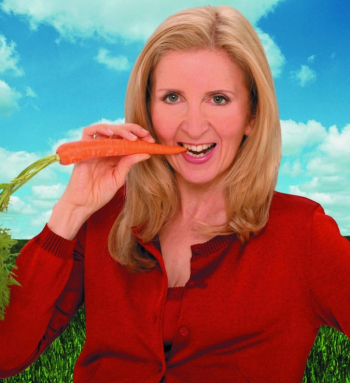The other day, a Facebook friend posted pictures of two 51 year olds: Gillian McKeith and Nigella Lawson. To be fair, he used an awful picture of Gillian (the first one pictured below), and an airbrushed one of Nigella. I have also included an airbrushed picture of Gillian (the second one below), for which she was clearly better prepared for the photographer. Gillian McKeith is a nutrition guru who had a British reality show on which she chose obese individuals to live with her and undergo a diet and exercise boot camp. What I liked best about the show was that she would show people what they were eating in a week by putting on one table everything they said they had eaten in the past week. It turned out to be a huge mass of mainly brown and white foods. Then she would show them a table of foods they should be eating in a week. It was a colourful rainbow of mainly vegetables and fruit. What I didn’t like about the show is she often belittled the individuals in her care, and showed an unpleasant autocratic streak. She also didn’t care whether these folks enjoyed their meals or exercise. At one point, she gave her charges some vile concoction they could barely swallow.
In contrast, Nigella Lawson is a TV cook. She does not shy away from meat, butter or dessert. I have no idea whether she gets cosmetic help or can afford a personal trainer. My Facebook friend’s point was that Nigella looked a lot happier.
Through my research and my own life, I know that people can become obsessed with heath, like Gillian. They can focus on what not to eat, what not to do, forcing themselves to do the right thing, even though they would rather do something else. It’s the “no pain, no gain” mentality. Sooner or later it can lead to falling off the wagon, and a scathing round of self-blame that can actually jeopardize your health plan (“I can’t do this,” “I have no willpower,” “I’m such an idiot,” etc.)
Enjoying life is a very important part of keeping on track with a healthy lifestyle. If you don’t enjoy your eating and exercise plan, you will probably not stick with it. All around us, we are bombarded with messages that reaching and maintaining a healthy weight is all about diet and exercise. However, factors such as stress, sleep, and social life are integral too.
Enjoy healthy pleasures in moderation, such as red wine, dark chocolate, nuts, full fat yoghurt, and smoked salmon. I am lucky that I live close to two bakeries. I can buy very fresh, still warm whole wheat bread on occasion. I try to focus on what I can eat, rather than what I can’t. I can eat as many vegetables as I want, in fact, the more the better. However, I have to retrain myself to think of vegetables as a yummy treat. I grew up with overcooked mushy vegetables that had no taste. I discovered the scrumptiousness of vegetables roasted in olive oil, and the simplicity, ease and refreshing qualities of eating raw cucumber alone, with a bit of salt or with hummus.
I still have a ways to go. During a time in my life in which I had very little money, I bought starchy foods because they filled me up for little cost. I still think of starches (rice, pasta, breads, etc.) as the main part of the meal. I bought one of those portion control plates recommended for diabetics. There is a small place on the plate for starches, a small place for protein, and half the plate is for vegetables. I am on my way to retraining myself to think of food this way, but years of habit are hard to undo.
The social aspects of eating are important for a healthy life. I have always insisted that my husband and daughter and I eat dinner together as a family. For breakfast, my husband insists on eating with headphones on with his computer plunked right on the dining room table. At least I succeeded in getting him to put the computer away during dinner. I found that often, we have little to talk about once we have all answered, “How was your day?” So I purchased a series of family dinner table questions, which not only gets us talking, but also discovering things about each other. This means we talk and linger at the dinner table, rather than wolfing down our food as quickly as possible and taking off.
Many people live alone, so unless they go out often with friends (which can become unaffordable) or invite people home (which some people are embarrassed to do), they may eat by themselves in front of the TV. Research has shown that people eat more and faster when they do this. If you have the equipment and live alone, would you consider virtual dinner parties? You could Skype a friend or a faraway family member and eat dinner together.
I have tried applying the enjoyment principle to moving my body too. But I have a hard time viewing exercise as anything but a chore. Even exercise that I enjoy, such as walking or dancing, feels to me like a waste of time. Of course it’s not. It helps me stay mentally and physically healthy, which in turn allows me to help my family and community. However, carving out time for my own exercise remains a psychological challenge. The other psychological challenge is that human beings have evolved to conserve our energy. When food was scarce and labour was hard, as it still is in some parts of the world, we needed to eat as much filling foods as possible, and only use energy when necessary. Now many of us live in the opposite kind of environment. Food is more than abundant, it is ubiquitous. Many of us have sedentary jobs, and use labour-saving technology. Many of us are still stuck in the survival mode of our ancestors, and have not adapted well to this new environment.
I don’t just want to be healthy, I want to be happy. Research shows that what makes people happy is good relationships with others, a sense of belonging, and a sense of meaning in their lives. Being psychologically well will help you feel worthwhile enough to do the things that will make you physically well. A healthy weight and a healthy life are much more than an eating and exercise plan. They require a happy life plan. Investing in healthy friendships, in a healthy community, and in projects that are meaningful to you will help you be the healthy person you can be.
Enjoy!



